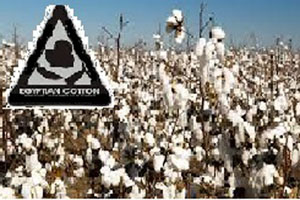
Ending of subsidy for Egyptian cotton farmers raise concern over future yield
YarnsandFibers News Bureau 2015-01-16 17:15:00 – EgyptThe Egyptian government has long given subsidies to cotton producers to make up for the gap between the high price of Egyptian raw cotton and the final price of products, which can be less than total production costs. Last week Adel Al-Beltagui, minister of agriculture and land reclamation, informed that the government will not be paying a cash subsidy of LE1,400 per feddan to cotton producers as it did last year. As, high cultivation costs, together with low local and international demand for Egyptian cotton, particularly the long-staple variety, were the main reasons behind the decision.
The cancellation of cash subsidies for cotton farmers has raised concern over the future of Egypt’s ‘white gold’. The farmers are advised not to cultivate cotton unless they had the means to market it as many spinning companies are refusing to buy the local and, compared to cheaper imported cotton, more expensive long-staple produce.
Last year the Ministry of Agriculture introduced a new cotton subsidies system providing LE1,400 per feddan for farmers through the Principal Bank for Development and Agricultural Credit (PBDAC). The subsidy was instituted by the Ministry of Agriculture on a temporary basis in response to the farmers’ problems, said Mohamed Abdel-Maguid, chairman of the Egyptian Cotton Council.
However, the farmers did not benefit from the subsidy as traders reduced the price of the cotton they bought from growers by LE200 per qentar. The average productivity of a feddan is seven qentars of cotton.
According to Abdel-Maguid, the cancellation of the subsidy was the right decision and it should help regulate the cultivation of cotton. Due to the lack of a clear plan, farmers used to plant cotton and then complain after harvesting it that they were unable to sell their crop.
Deputy Agriculture Minister Hamdi Aasi stated that removing the subsidy would benefit farmers because instead of the government giving direct support to producers amid price volatility in the global market, it would help coordinate favourable contracts between companies purchasing the crop and farmers.
This will give farmers a profit margin, instead of their dealing with the free market that goes up and down and endangers them with its price fluctuations.
Mohamed Qassem, chairman of the World Trading Company, a leading producer and exporter of ready-made garments, said that the subsidy had not been the correct solution to the industry’s problems, and that it should anyway have been included in a comprehensive strategy to deal with the long-neglected issue.
Textiles producers drew up a plan to help solve the cotton producers’ problems, but it was ignored by the government. The plan had included upgrading the quality of the cotton harvest, marketing it properly on international markets, and restructuring the state-owned spinning, weaving and textiles companies.
These companies were losing around LE2.2 billion a year, in addition to accumulated losses of LE28.7 billion. The use of the Egyptian long-staple variety of cotton in the local public-sector spinning and weaving companies, along with the high costs of labour, were responsible for the losses, according to Qassem.
Experts agree that Egyptian cotton has been facing problems since liberalisation of the industry in 1994. But the country should know the purpose of planting cotton. If it is for local industry, the textiles producers should determine their needs and conclude contracts with farmers before the cultivation season.
If it is for export and with a view to keeping Egypt’s share in the international markets, exporters should do the same thing. If no one is interested in buying locally produced cotton, farmers should be directed to cultivate other crops, he said.
The market for Egypt’s high-quality extra-long staple cotton, once known as the country’s “white gold,†has been shrinking for years. As farmers have turned to more lucrative crops and local textile firms shifted their focus to making low-quality products with cheap raw cotton imports.
In order to keep cotton as a strategic cash crop and encourage farmers to plant it, the government should keep the subsidies provided to farmers and announce a suitable price for cotton before the cultivation season in March. All concerned ministries should cooperate in marketing the cotton harvest locally and internationally, according to Ibrahim Ghanem, former head of the Agricultural Economic Research Institute.
Nasr Al-Qazaz, a professor of agricultural economics at Al-Azhar University in Cairo, said that the liberalisation of Egypt’s cotton sector in 1994 exposed farmers to volatile global prices and rising fertiliser costs. Cotton acreage fell dramatically, from 2.2 million feddans in the 1960s to 320,000 feddans today, which constituted four percent of the country’s arable land and produced 1.5 million to two million qentars annually.
Al-Qazaz, who had reservations about cancelling the subsidies, said that if the government is obliged to do so it should help market the cotton in cooperation with private and public-sector companies. He further added that almost all cotton growing countries the crop is supported by some kind of subsidy.
Leaving farmers without subsidies or available marketing programmes is de-motivating for them and will mark an end to cotton production in Egypt. The country was once famous for its cotton, especially under British colonial rule.
Egypt could cultivate the less costly short and medium-staple cotton in order to meet local needs instead of importing three million qentars of it annually.
According to Central Bank of Egypt figures, the value of Egypt’s raw cotton exports was down from $120.3 million in 2012-2013 to $83.8 million in 2013-2014.
Market Intelligence
Ask for free sample Report

experience
Customer Base
dedicated team
Countries Served Worldwide









